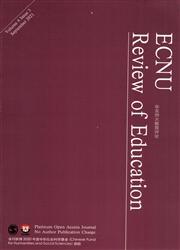教师在课堂教学中实施学习技能评价的反思实践
IF 2.6
Q1 EDUCATION & EDUCATIONAL RESEARCH
引用次数: 5
摘要
目的:本文考察了34位教师如何在教学中使用九种学习评估(AfL)策略进行自我评估,并通过对反思形式的反思陈述来证明他们自己的改进建议。设计/方法/方法:样本为参与该项目的10所小学和10所幼儿园的34名教师。学校发展主任(SDOs)被指派到学校进行课堂观察,记录教师是否在教学中使用了AfL策略。学生服务主任也会与老师分享和讨论他们的意见,这些老师已经把他们对研究问题的反馈写在了自我反省表格上。研究发现:幼儿园教师和小学教师在教学中对九种AfL策略的重视程度不同。他们自己提出的练习AfL技能的改进空间为提高教学效果提供了见解。原创性/价值:我们提出反思性实践可以产生一个“反思性螺旋”,即计划、行动、观察,然后反思。研究表明,反思性从业者通过自我提升和自我完善,成为能够保证教学质量的专业专家。本文章由计算机程序翻译,如有差异,请以英文原文为准。
Teachers’ Reflective Practices in Implementing Assessment for Learning Skills in Classroom Teaching
Purpose: This article examines how 34 teachers self-assessed their work with the nine Assessment for Learning (AfL) strategies in teaching and their own suggestions for improvement as evidenced by the reflective statements given on reflection forms. Design/Approach/Methods: The sample was a group of 34 teachers from 10 primary schools and 10 kindergartens who have participated in the project. School Development Officers (SDOs) were assigned to conduct class observations in the schools, in which they recorded whether the teachers had used the AfL strategies in teaching. The SDOs would also share and discuss the comments with the teachers who had returned the self-reflection forms in which they wrote their feedback on the research questions. Findings: The findings show that teachers in kindergartens and teachers in primary schools might have different emphases on the nine AfL strategies in teaching. Their own suggested room for improvement in practicing AfL skills has provided insights for enhancing teaching effectiveness. Originality/Value: We propose that reflective practices can generate a “reflective spiral” of planning, acting, observing, and then reflecting. The study shows that reflective practitioners become professional experts who are able to assure the quality of teaching by self-enhancement and self-improvement.
求助全文
通过发布文献求助,成功后即可免费获取论文全文。
去求助
来源期刊

ECNU Review of Education
Social Sciences-Education
CiteScore
4.90
自引率
0.00%
发文量
41
审稿时长
10 weeks
 求助内容:
求助内容: 应助结果提醒方式:
应助结果提醒方式:


